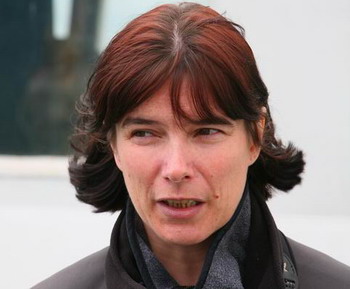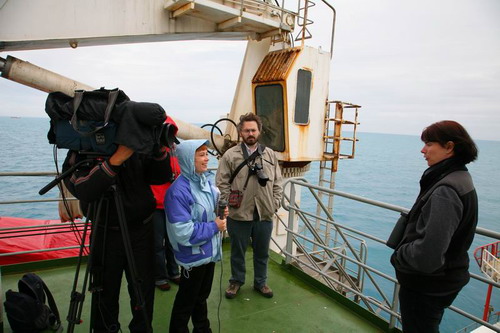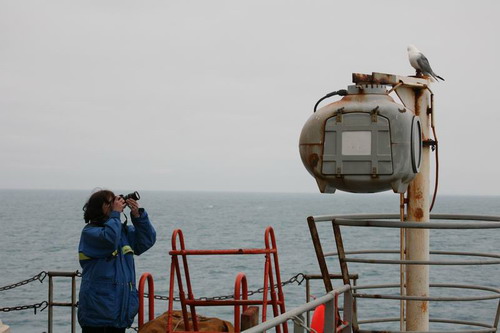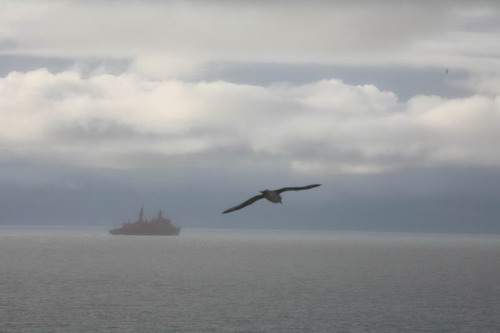Ivory gull (Pagophila eburnea). Interview with Maria Gavrilo, ornithologist

A team of three ornithologists in the helicopter on July 27th, left for Franz Josef Land. On the island of Hays, where the revived polar station n.a. Ernst Krenkel (Papanin’s radioman) is located, within a few days they are to survey the bird population which is a symbol of purity.
Maria graduated from the Biology Faculty of Leningrad State University n.a. Zhdanov. In the second year she had already gone to the Kandalaksha State Reserve, to study birds. Last year, she bathed in the ocean at the North Pole. The coldest temperature was 1.8 degrees below zero, when she took sea baths. In general, she often swims in the Arctic. And she is going to plunge into the waters of Franz Josef Land. The main thing is that there was no wind and the water was of exceptional purity there. After such a bath, she feels as though she grows wings...
- Maria, a project to study the ivory gull is international and has important scientific objectives. What are they?
We are going to study the population of the Ivory Gull. Our project is a part of Russian-Norwegian cooperation in nature conservation in the Barents Sea region, and the Ivory Gull is an integral part of an extensive programme for the International Polar Year. Its goal is to assess the population status of this rare Arctic species. We need to get to the island where the ivory gull nestles, try to find a nesting colony. Our main task is capturing and banding birds to track their migration, where they forage, where they fly for the winter and if they return to a nesting. We will also take blood samples.

By the way, to lure the birds we are taking 30 kilos of fat. In general, our luggage is cumbersome – we took 33 seats on the train. We are carrying equipment, bird catching equipment and a lot of food.
-What is the name of the bird in Latin and what is the translation?
In Latin it is Pagophila eburnea, which means “a lover of ivory ice” This is very true and typical for the ecology of this species.

- How do the climate changes influence the habitats of the snow-white bird?
The Ivory gull is unique. It can be found only in some areas where there is drifting ice, and it collects food from the water, where there is ice. There is a hypothesis that global warming affects the population of this species, its dispersal (including their cut in some areas of the Arctic). There is a shrinking of ice cover, and its redistribution, we believe that in connection with this Ivory Gull nesting sites move too. In order to prove or disprove this hypothesis, the Russian-Norwegian project Ivory Gull was created. If we succeed, we’ll put the transmitters to track the movement of birds, compared with maps of ice to find out how close this relationship is, and what happens to Ivory gulls in relation to climate change.
- What are the conditions of your living on an island?
Three scientists are involved in the expedition. We work with Andrey Volkov and Mikhail Ivanov. The conditions will be very comfortable. We had planned a landing on the island of Hayes, which is now the only functioning polar station in the archipelago. Earlier, 120 people worked in the observatory. Then, in the years of perestroika, it was abandoned. Today the station is re-arising, and 4 scientists conduct their research there. We also have an agreement for living there.

- This is the place where a large number of polar bear lives. How are you going to ensure your security, because we know that it is an absolutely fearless predator?
Meeting a bear is projected on Franz Josef Land, and there is a big chance. We are prepared for such meetings and will follow all the rules, because the polar bear is the host in this region and we are his guests; so we will behave like guests, avoiding any conflicts, but in case of emergency we are prepared and armed. The task is to keep any bear at bay avoiding close meetings; maybe we will scare them off by missiles or rubber bullets.
- Everybody wants to be in the south, where it is more comfortable, and you are to the north, in the Land of ice. You’re a young woman, why do you prefer such a life with a piercing cold and lack of civilization?
I am pulled to the Arctic and Antarctic, polar regions. The air is fresh there, nature is wonderful and it is not as hot as in St. Petersburg!
The Arctic is a unique region, which purifies the soul.
Natalia Yurchenko
Press Secretary of Director General of MVK
The research vessel Akademik Fedorov, the Arktika-2007 expedition, the Arctic Ocean
